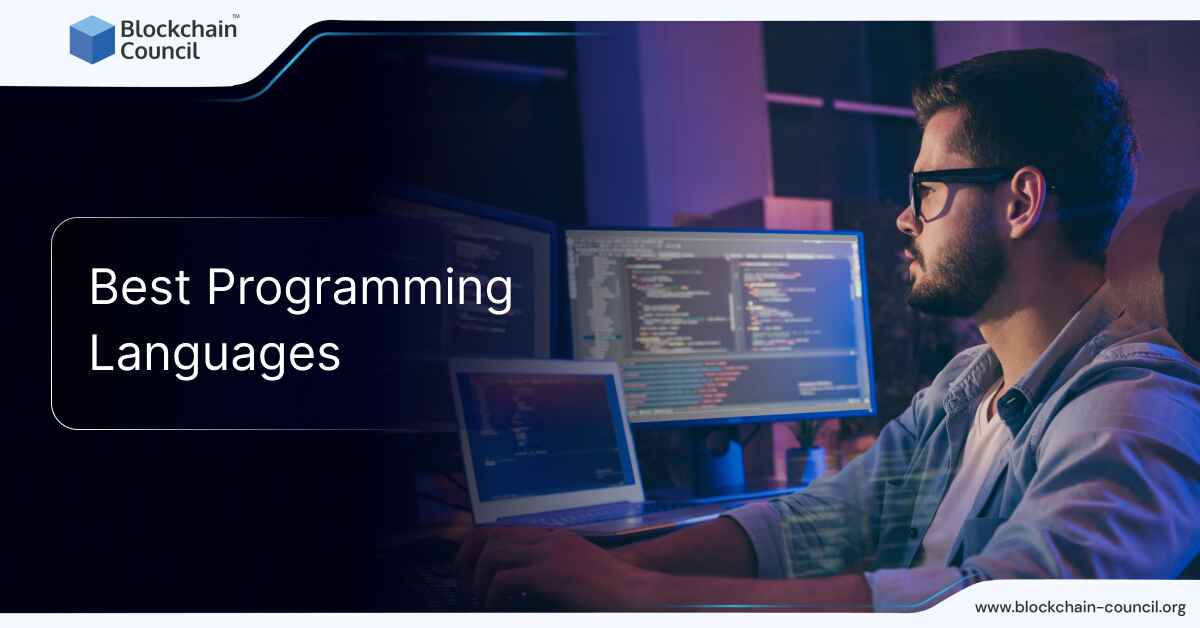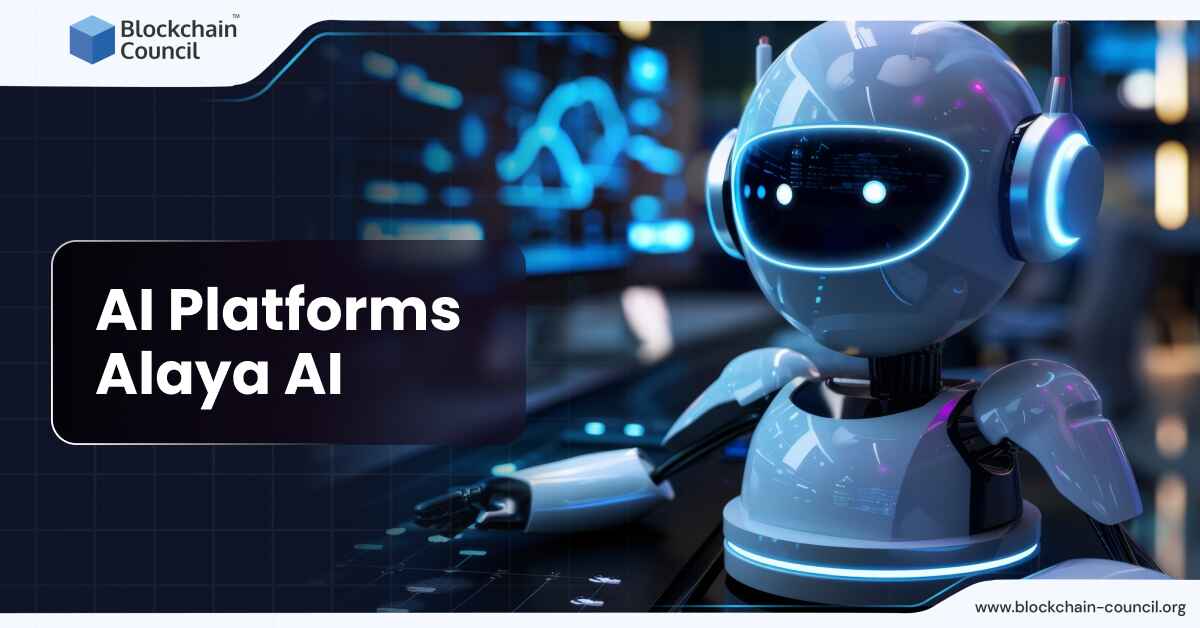
- Blockchain Council
- January 03, 2025
Programming remains a vital skill in today’s fast paced tech world. More than half career options in the digital field require coding knowledge. Therefore, learning a programming language is crucial for those looking to develop software, manage data, or drive innovations. As we move into 2025, some programming languages have established themselves as essential due to a number of reasons. While the options are many, it is crucial to know what is the best programming language to learn? Which programming language is best for getting job?
The simple answer is, Python, Node.js and React. Read ahead to know why they are among the best programming languages to learn.
What is a Programming Language?
Before we discuss the top programming languages, let’s briefly discuss what a programming language is.
A programming language is a set of instructions that we use to tell a computer what it should do and how. Think how humans communicate with each other in different languages. Similarly, programmers or developers use programming languages to communicate with computers. These instructions are needed for a computer to learn how to perform tasks.
You might be wondering, what kind of tasks?
Every task a computer performs requires the use of programming languages. Even if you want your computer to sum two basic numbers, you need to use a programming language for instructing it to do so. From such basic tasks to creating something complex like a video game, programming language is the medium for talking to your computer. However, the difference lies in the way you write this language.
You cannot write a programming language in the language you speak to your friends or write emails. Every programming language has its own rules for writing instructions. These are known as syntax. This is similar to grammar in human languages. Just like the way grammar guides us how we should use words, annotations, etc. to make an understandable sentence, syntax guides how a programming language needs to be written for the computer to understand your commands properly.
When you give your computer instructions in a programming language, it converts them into machine code. The computer then understands your commands and executes them accordingly.
So, what are the best programming languages?
Let’s find out
Best Programming Languages to Learn
Choosing what is the best programming language to learn can be a daunting task. Every programming language comes with its own advantages and disadvantages. Each of them is more suitable for a particular task than the other. For example, Python is the best programming language for Machine Learning. Meanwhile, JavaScript is one of the most popular programming languages for web development. So, which programming language is best for getting job in today’s scenario?
Keeping the current market state in mind, we have chosen the 3 best programming languages that you must learn to land a job:
- Python
- Node.js
- React
Below we will discuss why these three are the top programming languages for getting a job.
Python
Python is one of the top choices for anyone looking to get into programming. And it’s all for good reasons. Hearing the word “programming language” might scare many beginners. People see the name of a programming language and wonder, is it the hardest programming language to learn? With Python that’s not the case. Here are some reasons why Python is one of the top programming languages to learn:
- Easy to Learn: We have already talked about the grammar of programming languages, syntax. Python’s syntax is clear and matches the English we use everyday. This makes it easier to write and read without complex traditional programming structures and syntax rules like semicolon or parenthesis. This simplicity of Python makes it one of the best programming languages for beginners.
- Versatility: Along with being simple, Python is versatile as well. You can apply it anywhere from web development to data analysis, artificial intelligence, scientific computing, and many more. Python is a general-purpose language that you can use for various types of programming and software development.
- Rich Libraries and Frameworks: Python offers an extensive range of libraries and frameworks. You can use Django and Flask for web development and also use NumPy and SciPy for scientific computing. Having access to such a rich ecosystem allows you to perform even the most complex coding tasks with more efficiency and ease.
- Highly Readable Code: With Python, you will need to write fewer lines of code to perform the same tasks compared to other major languages like C++ and Java. This makes it more maintainable and a good choice for both small and large projects. Since it is highly readable, it’s easier for teams to collaborate on projects built on Python.
- Great for Prototyping: Python allows you to quickly create a fully-functioning. This is extremely useful in building prototypes and testing out ideas without spending too much time on code structure.
- Career Opportunities: Before starting this section, we assured you to answer the question, “Which programming language is best for getting job?” There is a strong demand for Python skills in the job market. Python is the third “most wanted” programming language to developers. Coders primarily use Python. Many tech companies and startups prefer it due its applications in trending technologies like machine learning and big data. In the U.S., the average salary of a Python developer is over $125,000. Learning Python can significantly boost your employability.
- Strong Community Support: Python has a large and active community. This community contributes to a vast number of libraries and frameworks that extend Python’s capabilities. The community also offers extensive support through forums like Stack Overflow, open-source projects, and tutorials. These can be incredibly helpful as you’re learning the language or when you need help solving specific problems.
Now the question arises, how to learn Python?
Certifications are one of the best ways to learn something new without spending a lot of time on it. The Certified Python Developer™ certification by the Global Tech Council is the best Python certification to start learning the language and be certified as a skilled developer.
This expert curated certification covers everything from the basics of Python to its advanced applications. Further, you will be well-prepared to tackle real world challenges with hands-on experience. The best part? You can complete the training online, at your own pace, with just 5 hours of dedicated study time. The globally recognized certification will open numerous doors of opportunities. Plus, once certified, you’ll enjoy lifetime access to the course materials.
Node.js
Next we have Node.js, one of the top software engineer languages to learn. It is one of the simplest yet most versatile programming languages. Here’s why you must learn Node.js to stay ahead in a competitive landscape:
- JavaScript Integration: If you’re already familiar with JavaScript for web development, Node.js will make your work easier. It uses the same language you’d use for front-end development (client and server sides). This means you can spend less time learning new syntax and more time improving your skills.
- Efficiency and Performance: Node.js is built on Chrome’s V8 JavaScript engine. Therefore, it can execute JavaScript code outside the browser efficiently. Its event-driven architecture handles operations asynchronously. This enables non-blocking (concurrent handling of requests), and enhances performance especially in real-time applications. It means you can use Node.js for long-running tasks while keeping responsive to other events. No need to wait anymore for one task to be done to start another.
- Rich Ecosystem: Node.js works with npm (Node Package Manager). It offers over 1 million free libraries, a rich set of tools, and resources through npm. With it, you can add functionality to your applications with more ease.
- Demand in the Job Market: There’s a strong demand for Node.js developers in the market. Major companies often use Node. is their tech stack. This demand makes Node.js a valuable skill in the job market. Average salary of a Node.js developer in the U.S., is over $122,000.
- Suitable for Microservices: Node.js is well-suited for building microservices. Microservices are small, modular services that work together to build complex applications. This architectural style is gaining popularity and Node.js is being more in-demand.
- Versatility Beyond Web Development: Is Node.js only for web development? The simple answer is no. Yes, it is commonly used for web applications. But Node.js is also capable in areas like the development of IoT (Internet of Things) devices, real-time services, and even tools for operations and infrastructure management.
So, how do you learn Node.js?
As you already know, it is not the hardest programming language to learn. Learning Node.js is made easy with the Certified Node.js Developer™ certification by the Global Tech Council.
Curated by experts, this certification takes a holistic approach to provide you with a comprehensive learning program. It starts with the Node.js basics and then covers advanced concepts in an interactive way. With just 10 hours of online learning, you can become a certified Node.js developer at your own pace. Further, with lifetime access to the course materials, you can revisit and rekindle your learning whenever needed. The lifetime valid certification matches industry standards and is globally recognized by leaders in the tech space. It is the best Node.js certification that will help both beginners and professionals gain expertise and recognition in this field.
React
We can’t miss out on React if we are talking about the best programming languages to learn. React is one of the top choices in web development today. The reasons for this are many. Let’s look at some of them:
- Easy to Learn: Compared to other front-end frameworks or libraries, React is easier to learn. If you already know JavaScript, you’ll find that picking up React is relatively simple. It uses a mix of HTML-like syntax and JavaScript.
- Reusable Components: React is built around the concept of reusable components. This means you can create a component once, like a button or a navigation bar, and use it multiple times across your application without rewriting the code.
- Strong Community and Resources: React has a large and active community. This community contributes to a vast amount of learning resources such as tutorials, forums, and third-party tools. Also, with frequent updates and improvements, React stays current with modern web development trends.
- Flexible and Efficient: React’s design makes it very efficient to update the looks of a website. React efficiently updates websites and renders just the right components when it’s needed.
- Compatible with Other Tools: Unlike many other software engineer languages, React is compatible with a variety of other libraries and frameworks. This means you can integrate it into existing projects or use it alongside other tools to create more complex applications.
- Popularity and Demand: React.js is one of the best programming languages for building single-page applications. The framework is used by over 11.9 million websites. And the count is increasing everyday.
- Job Market and Economic Value: The market for React development services is expected to grow significantly. It is expected to reach $28.6 billion by 2027. This growth proves, if you want to be among high demand professionals, you need to step up with React. Average salary of a React developer in the U.S. is over $121,000.
- Ease of Learning and Efficiency: React employs a declarative approach. This means you describe to React what you want the UI to look like and React takes care of updating the Document Object Model (DOM) as per your description. it’s easier to predict and debug a code if you know React. This approach simplifies the process of state management and updating components.
- Backward Compatibility: React is known for its backward compatibility. This means it can work with both old and new architecture. You can update the framework without making significant changes in the existing applications. This stability is crucial for developers, as it reduces the need to relearn things for each update.
So, it is clear that React is indeed one of the best programming languages to learn. But, how to learn programming in React? What is the best way to learn React?
The Certified React Developer™ certification by the Global Tech Council is the answer. This certification program is crafted by industry experts and covers everything from React fundamentals to advanced topics. Further, you will have the chance to apply your knowledge in hands-on projects. With just 4 hours of dedicated study time, you can become an industry recognized certified React developer at your own pace. The certification program is online so you can enroll from any corner of the world with an active internet connection. Moreover, you will have lifetime access to the course material. So whenever you feel you need to refresh your knowledge, you can do so.
Conclusion
Choosing the right programming language to learn in 2025 depends on your career goals, interests, and the type of projects you want to undertake. Languages like Python, Node.js, and React continue to be among the best programming languages. Learning any of these can significantly boost your career.
However, it is important to remember that not all emerging tech fields require deep programming knowledge. For instance, advancements in AI have created opportunities that bypass traditional programming routes. Those interested in AI can benefit from our specialized AI certifications. These certifications are designed to help you master AI skills without any prior programming knowledge.
Frequently Asked Questions
Which programming language is best for getting a job?
- Python, Node.js, and React are among the top programming languages for getting a job in 2025.
- Python is in high demand for its versatility in fields like web development, data analysis, and machine learning.
- Node.js is sought after for its efficiency and suitability for building scalable web applications.
- React is popular for its ease of learning and widespread use in creating dynamic user interfaces.
What are the best programming languages to learn?
- Python, Node.js, and React are the best programming languages to learn.
- Python is ideal for beginners due to its simplicity and readability, with applications in various domains such as web development and data science.
- Node.js is valuable for web development, offering efficiency and performance for building server-side applications.
- React is excellent for front-end web development, featuring reusable components and strong community support.
How to learn a programming language?
- Start with online tutorials or courses to grasp the basics of syntax and concepts.
- Practice coding regularly to reinforce learning and improve problem-solving skills.
- Engage with coding communities and forums to seek help and exchange knowledge.
- Consider enrolling in certification programs offered by reputable organizations like the Global Tech Council for structured learning and industry recognition.





































































 Guides
Guides News
News Blockchain
Blockchain Cryptocurrency
& Digital Assets
Cryptocurrency
& Digital Assets Web3
Web3 Metaverse & NFTs
Metaverse & NFTs
